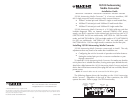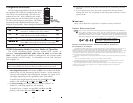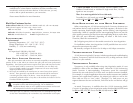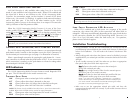
•In Force 100 mode, the media converter converts 100Base-TX to
100Base-SX multi-mode or 100Base-FX single-mode fiber; 10 Mbps
signals are not accepted.
There is no auto-negotiation in Force-100 mode.
To enable Force-100 mode, set switch S7
to the ON position, with
switches S6
and S8 in the OFF position.
A UTO-N
EGOTIATION ON YOUR M EDIA C ONVERTER
When connecting two 10/100 Autosensing Media Converters between two
end stations (devices such as switches, hubs and repeaters), all devices in the
media conversion should ideally support, and be utilizing, Auto-Negotiation
functionality. While it is possible to have auto-negotiating devices on one side
of the media conversion and fixed (non-auto-negotiating) devices on the other,
link LEDs will react differently depending on where a link fault occurs.
Therefore, Black Box recommends:
A)
Configuring every device in the media conversion for Auto-Negotiation.
For installations where Auto-Negotiation is NOT possible from one end of
the media conversion to the other:
B)
Manually configure all devices for 10 Mbps or 100 Mbps connections.
T
ROUBLESHOOTING F EATURES
10/100 Autosensing Media Converter include two advanced troubleshooting
features, Transparency and Link Fault Detection (LFD), to help you locate “silent
failures” on your network.
T RANSPARENCY F EATURE
Transparency is only available when using Auto-Negotiation mode; it is not
available in either of the two Force modes. When the 10/100 Autosensing
Media Converter is auto-negotiating, Transparency treats the connection
between the two end devices as if there were no media converters installed.
For example, in a typical application where two media converters are installed
between two copper-based switches, the twisted pair cables as well as the
fiber cable are seen as “one” entity. Therefore, if a fault occurs on any
segment between the two end devices, link LEDs on the end devices will go
out.
As stated, Transparency is available when the 10/100 Autosensing Media
Converter is operating in Auto-Negotiation mode, therefore S6
(AN/PNP) must
be ON
and S5 (LFD), S7 (Force) and S8 (10/100) must be OFF.
6
3
• If using a high powered device (which is designed for long distance
installations) for a short distance installation, the fiber transmitters may
overdrive the receivers and cause data loss. If this is the case, you may
need to add an optical attenuator to your connection.
Please contact Black Box for more information.
Black Box Customer Service
Order toll-free in the U.S.: Call 877-877-BBOX (outside U.S. call 724-746-5500)
FREE technical support, 24 hours a day, 7 days a week:
Call: 724-746-5500 Fax: 724-746-0746
Mail order: Black Box Corporation, 1000 Park Drive, Lawrence, PA 15055-1018
Web site: www.blackbox.cox E-mail: info@blackbox.com
S PECIFICATIONS
Environmental
Operating Temperature: 32° - 122° F (0° - 50° C)
Storage Temperature: 20° - 160° F (-20° - 70° C)
Humidity: 5 - 95% (non-condensing)
Power
AC Input Load: 100/240 ±10% VAC
100 ±10% VAC ~ 50-60 Hz, 0.1A
240 ±10% VAC ~ 50-60 Hz, 0.05A
F
IBER O PTIC
C LEANING G UIDELINES
Fiber optic transmitters and receivers are extremely susceptible to contamination by
particles of dirt or dust which can obstruct the optic path and cause performance
degradation. Good system performance requires clean optics and connector ferrules.
1) Use fiber patch cords (or connectors, if you terminate your own fiber) only
from a reputable supplier; low-quality components can cause many hard-to-
diagnose problems in an installation.
2) Dust caps are installed by the manufacturer to ensure factory-clean optical
devices. These protective caps should not be removed until the moment of
connecting the fiber cable to the device. Assure that the fiber is properly
terminated, polished and free of any dust or dirt and that the location is as free
from dust and dirt as possible.
WARNING! Integrated circuits and fiber optic components are extremely
susceptible to electro-static discharge damage. Do not handle these
components directly unless you are a qualified service technician and use tools
and techniques that conform to accepted industry practices.
3) Store spare caps in a dust-free environment such as a sealed plastic bag or box
so that when reinstalled they do not introduce any contamination to the optics.






